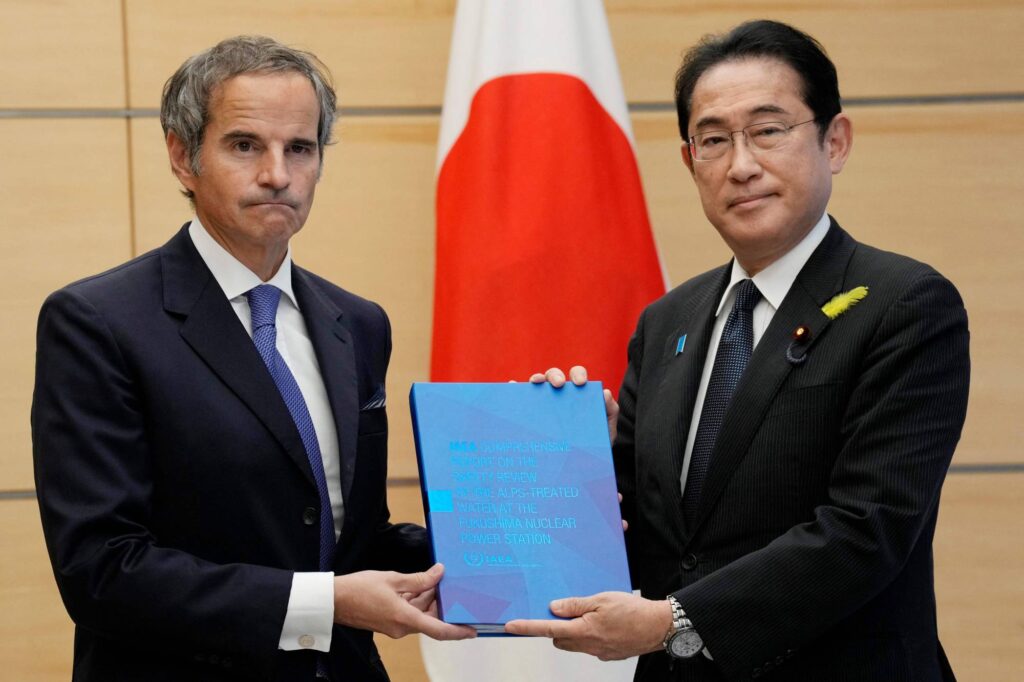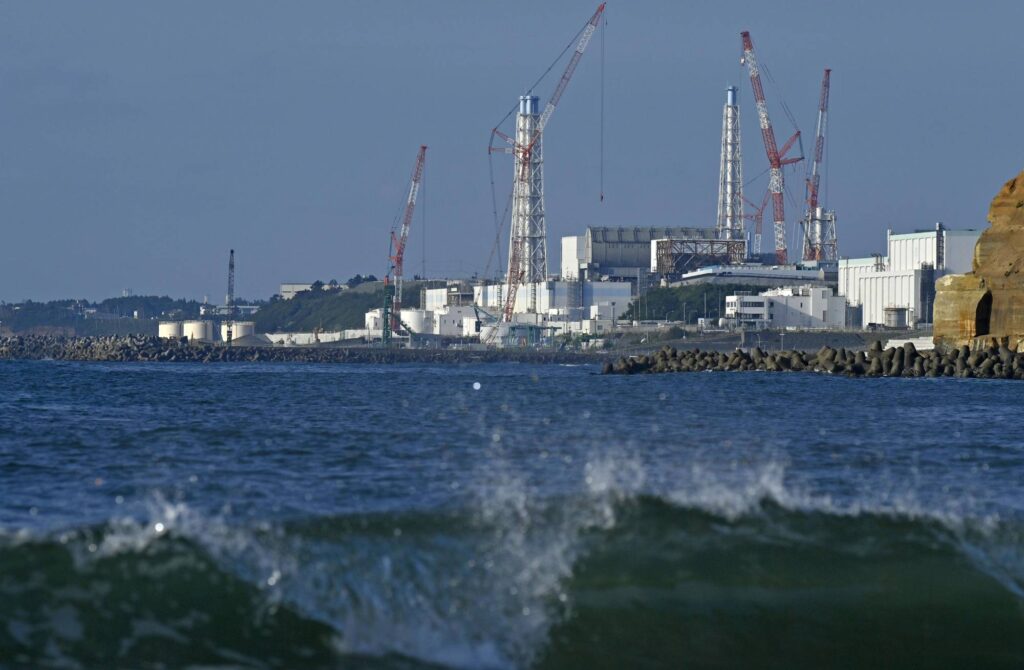IAEA Endorses Japan’s Release of Treated Water from Fukushima Plant
ENVIRONMENT, 10 Jul 2023
Eric Johnston | The Japan Times – TRANSCEND Media Service

Rafael Grossi, director general of the International Atomic Energy Agency, presents Prime Minister Fumio Kishida with the IAEA’s comprehensive report on the plan to release treated water from the Fukushima No. 1 nuclear plant, at the Prime Minister’s Office in Tokyo on 4 Jul 2023.
| POOL / VIA AFP-JIJI
4 Jul 2023 – The International Atomic Energy Agency gave an essential endorsement today of a controversial plan by Japan to release treated water from the crippled Fukushima No. 1 nuclear power plant into the Pacific, paving the way for it to be released this summer.
Ahead of his meeting with Prime Minister Fumio Kishida, IAEA Director General Rafael Grossi presented the organization’s safety assessment report, which concluded that the discharge of the treated water into the sea is “consistent with relevant international safety standards.”
“If the Japanese government decides to proceed with the plan, (it) would have a negligible impact on the environment, meaning water, fish and sediment,” Grossi said at a news conference following his meeting with Kishida.
Grossi said that the IAEA will continue to monitor the situation if the plan to discharge the treated water moves forward.
“The IAEA will be here permanently, reviewing, monitoring, assessing, these activities for decades to come,” he added.
Kishida, meanwhile, reiterated that he would not allow the treated water to be discharged if there are signs it would have a harmful impact on human health and the environment.
“Japan will continue to provide explanations to the Japanese people and the international community in a sincere manner, based on scientific evidence and with high levels of transparency,” the prime minister said.
On 5 Jul, Grossi will travel to Iwaki, Fukushima Prefecture, where he will meet with local residents before touring the Fukushima No.1 plant, which experienced a triple meltdown following the March 2011 earthquake-triggered tsunami. The IAEA chief will then visit South Korea on Friday 7 Jul to talk with government officials, Yonhap News reported Tuesday, 4 Jul 2023.
In early 2021, Japan announced its basic policy for discharging the water, which will be treated through a filtration system known as the Advanced Liquid Processing System (ALPS). The high-tech treatment machines are able to remove most radionuclides except tritium. As such, water laced with tritium will be released into the sea, and Japan requested that the IAEA review the safety of the plan.
“It should be noted that the total amount of tritium … to be released each year in the discharge of ALPS-treated water will be well below the amount of these radionuclides produced by natural processes each year, such as interaction of cosmic rays with gases in the upper atmosphere,” the IAEA report said.
Over the past two years, the IAEA has conducted a safety review to see how Japan’s plan measures up against international safety standards.
But the plan to release more than 1 million cubic meters of treated water currently being stored at the Fukushima plant into the surrounding ocean has angered Japan’s neighbors.
On Tuesday, Chinese Ambassador to Japan Wu Jianghao said in a news conference that Japan should not discharge the water, saying they are making the wrong decision.
“Japan needs to halt the water release plan, discuss with the international community and come up with measures that are scientific, safe and transparent and persuasive to other countries,” he said.
Meanwhile, South Korea has softened its stance amid thawing ties between the two countries. Seoul dispatched a scientific delegation in May to offer its own assessment, and it is expected to present its scientific analysis soon.
Local fishermen in Fukushima are also opposed to the water release, fearing that it will be another blow to the reputational damage of the prefecture’s fish and seafood.
____________________________________________
Eric Johnston is a Staff Writer for The Japan Times.
Staff Writer Gabriele Ninivaggi contributed to this report.
Go to Original – japantimes.co.jp
Tags: Capitalism, Ecology, Environment, Fukushima, IAEA, Japan, Marine pollution, Nuclear Disaster, Nuclear Energy, Nuclear Meltdown, Nuclear Waste, Pacific Ocean, Radioactive Waste
DISCLAIMER: The statements, views and opinions expressed in pieces republished here are solely those of the authors and do not necessarily represent those of TMS. In accordance with title 17 U.S.C. section 107, this material is distributed without profit to those who have expressed a prior interest in receiving the included information for research and educational purposes. TMS has no affiliation whatsoever with the originator of this article nor is TMS endorsed or sponsored by the originator. “GO TO ORIGINAL” links are provided as a convenience to our readers and allow for verification of authenticity. However, as originating pages are often updated by their originating host sites, the versions posted may not match the versions our readers view when clicking the “GO TO ORIGINAL” links. This site contains copyrighted material the use of which has not always been specifically authorized by the copyright owner. We are making such material available in our efforts to advance understanding of environmental, political, human rights, economic, democracy, scientific, and social justice issues, etc. We believe this constitutes a ‘fair use’ of any such copyrighted material as provided for in section 107 of the US Copyright Law. In accordance with Title 17 U.S.C. Section 107, the material on this site is distributed without profit to those who have expressed a prior interest in receiving the included information for research and educational purposes. For more information go to: http://www.law.cornell.edu/uscode/17/107.shtml. If you wish to use copyrighted material from this site for purposes of your own that go beyond ‘fair use’, you must obtain permission from the copyright owner.
